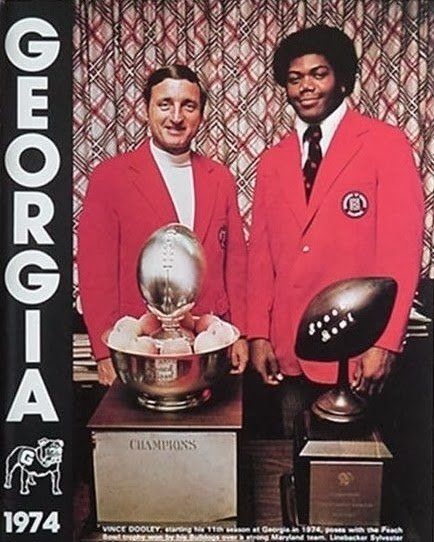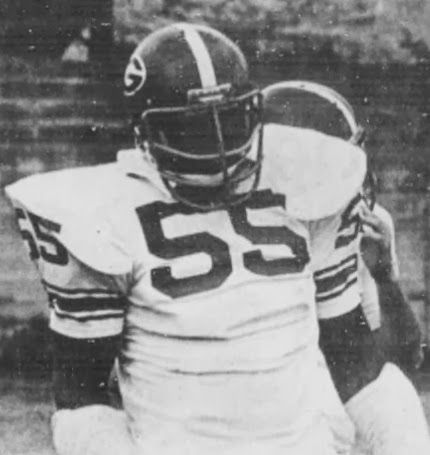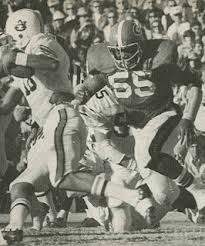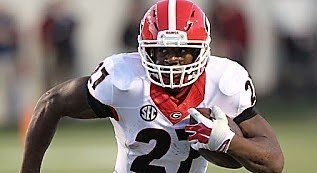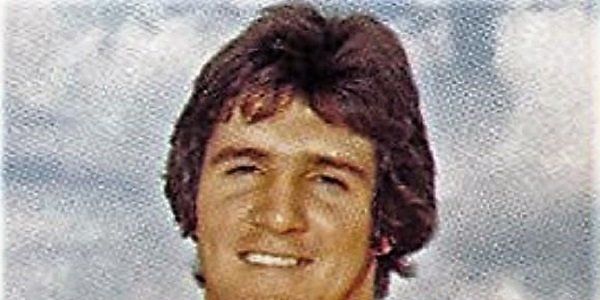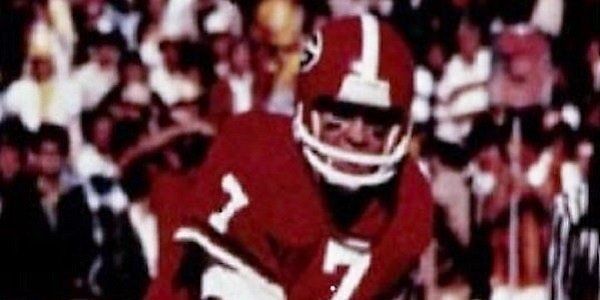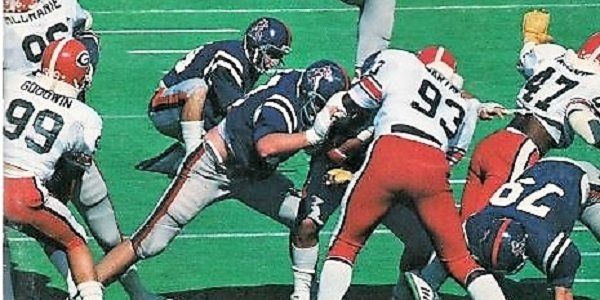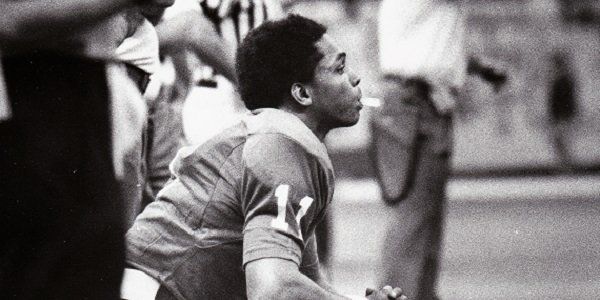Where's The Blur? He's been found.
The lone black man was indeed "Bolo," or Sylvester Boler, who also earned the nicknames of "The Black Blur," "Sly," and "The Sacker" during his tenure at Georgia, yet the number of games he actually appeared in might equal to only just over a full season. As far as the number of games he was actually 100% healthy for, there were only a few--very few.
I certainly knew of Boler, even mentioning him three times in less than a year on this very blog as a freshman phenom, an unknown hero in the Auburn series, and his unfortunate gun-pulling incident in the spring of 1975 after having an orange thrown at him. And, primarily because of that incident, I thought Boler had left the program and then simply disappeared. However, there he was in the flesh at the BBQ almost four entire decades after the orange-throwing episode, now surrounded by two additional white guys than before for a total of about a dozen.
Although a seemingly complicated individual while at Georgia, Boler's career as a Bulldog could be described rather simply: After playing in just five games in 1973, he was already considered perhaps the greatest linebacker ever at the school. His success, although transpiring in such a short period, was so tremendous, Georgia made Boler the cover boy of the team's 1974 media guide--just him, Dooley, the 1973 Peach Bowl championship trophy, and Boler's defensive MVP trophy for the bowl game gracing the cover. However, as they say, how the mighty can fall.
Following an All-SEC campaign in 1974, Boler was evidently thrown off the team for pulling a gun on Andy "Breezy" Reid at McWhorter Hall after the teammate threw an orange at him--an act that many in the media speculated as indicative of racial unrest on the Bulldogs' football team. After sitting out the season, an attempted comeback was cut short when Boler abruptly left the squad for good less than two weeks prior to the 1976 season opener, reportedly without any explanation.
"Where've you been, Bolo?" asked someone from the group which circled Boler at the BBQ. It was a valid question. In fact, The Red and Black in January 1978 issued Boler the "dubious" sports honor of "The Whatever Happened To Him Award." Evidently, at least one of Boler's old teammates still wondered the same years later.
"Oh, I've been around..." replied Boler with a laugh.
I was able to briefly chat with Sylvester that afternoon. Still, about a month and a half later, a friend reminded me that it was the 40th anniversary of The Black Blur's assault on Tennessee and quarterback Condredge Holloway. That, coupled with me recalling this past December the story of Boler singing Christmas carols on Augusta television during the same time in 1973, and I wanted to chat with him further and find out what a number of Bulldog faithful have wondered for many years: Where's The Blur, and whatever happened to him after he left UGA?
Although it took me a few weeks, I discovered "where," but first a little more background...
"To understand the impact Sylvester made when he debuted in '73, think of when Herschel Walker came on the scene, except seven years earlier and a defensive player," a teammate of Boler's recently informed me. "We had never seen a player quite like him, and fortunately for us, neither had our opposition."
Highly recruited out of Augusta's Lucy Laney High School, Boler arrived on the UGA campus with a torn quad muscle, forcing him to miss the first two months of the season. However, once healed, there would be no redshirt season for Boler; he was much too special not to play immediately.
Late in the third quarter of Georgia's game at Tennessee in early November, and with the Bulldogs trailing, Boler was inserted at Sam linebacker, becoming the seventh African American to play varsity football at UGA, and the very first as a true freshman.
If there was any indication Boler played with much aggression, it came the first time he made contact with an opposing ballcarrier, hitting a downed Tennessee back a little after the whistle and drawing an unsportsmanlike penalty. Regardless, a quarter later, Boler had already registered at least a half-dozen tackles, and Georgia led 35-31. However, behind the arm of quarterback Holloway, the Volunteers reached midfield with 32 seconds remaining. But, then IT happened, and my guess the reason why Boler was nicknamed "The Black Blur" in the first place.
(Final three plays of '73 Georgia-Tennessee game on silent coaches film; the first play resulting in Boler's head-knocking, decleating sack of Holloway):
Boler's sack was described by a local sportswriter as one which "literally tore Condredge Holloway's head off." The sack, plus his all-around play that afternoon in Knoxville, was indication of how extraordinary Boler actually was. As mentioned, no Bulldog had ever played with or against someone with that kind of ability.
Boler stood at 6-foot-3, weighing 235 pounds--extremely large for a linebacker back then. So large, in fact, Georgia would not have a bigger starting linebacker until the late 1980s, or 15 years afterwards. Plus, Boler had tremendous speed, consistently clocking a 40-time in less than 4.5.
"Upon my arrival to Georgia, I had never lifted weights," Sylvester informed me from his Atlanta-area home when I finally was able to reach him last week. "Regardless, I had a disciplined regiment of swimming during the summers, which helped my strength and speed, and I had 32-inch thighs. It all came to fruition in 1973 when I first got on that field. I had the speed; I had the strength; I had the knowledge of the game plan. It was there...it was there."
By that time, upperclassmen had already considered Boler special; he was not your run-of-the-mill freshman, and thus wasn't treated like one.
"When we came to camp, I was introduced to a part of the freshman initiation, where the older guys got on the top floor [of McWhorter Hall] and 'hazed' the freshmen as they ran around below in the parking lot," Sylvester recalled. "The older guys told me, 'you gotta go [with the freshmen].' I told them that I was staying up top with them (laughing). Instead of running around with the freshmen, I'm going to watch the freshmen run around."
Above all, Coach Dooley never treated Sylvester like a freshman in 1973. Boler never practiced or played with the Bullpups squad--unheard of for a Georgia freshman back then. Instead, he was always a member of the varsity, even traveling with the team while injured.
It was Coach Dooley who sealed the deal for Boler to come to Georgia to begin with via a letter, not from the head coach, but from a good friend.
"You know, Coach Dooley and Hank Aaron were both from Mobile [Alabama] and good friends," Sylvester said. "One day, I get a letter from Hank Aaron, saying that UGA would be a good place for me. When my mom got that letter, as far as all the other schools that recruited me hard--Ohio State, Tennessee, Florida State, Florida, Notre Dame, and all the others--they all might as well forget me coming there (laughing)."
Dooley spoke at Lucy Laney's "sports day" in 1973, where Boler was not only recognized for his achievements on the football field but also as an all-state weight man in track and field.
"I was fortunate to be part of an excellent football program at Lucy Laney, coached by David Dupree, who was the first black coach elected to the Georgia Sports Hall of Fame," Sylvester stated. "In a way, that great program helped me appreciate the great Georgia program I would soon encounter and how I would feel about Coach Dooley. I didn't like Vince Dooley, I loved Vince Dooley. I had a reverence for that man."
After the Tennessee game, Boler spearheaded a Georgia defense which held Florida to 11 points. Then, Dooley obviously had a reference for Boler, giving his star freshman linebacker his initial start versus Auburn. Against the Tigers, Boler recorded 18 tackles and earned SEC player-of-the-week honors. In the regular-season finale against Georgia Tech, he registered a critical, fourth-down sack with the Jackets deep in Georgia territory, clinching a 10-3 victory for the Bulldogs. For Georgia's final three regular-season games against its "Big Three," Boler was described by a writer as "THE defense."
Leading up to the Peach Bowl, it was during Christmas break when the team learned that Sylvester had yet another talent--music. Appearing on a Augusta television station, Boler sang Christmas carols.
"Music was my background; I started playing the trumpet when I was in the fourth grade," Sylvester stated proudly. "In fact, music is where I developed my discipline. Believe it or not, when I was in high school, nearly all of Lucy Laney's starting offensive and defensive line sang in the school choir."
Still, upon Sylvester's return to UGA from Christmas break, as you can imagine, he was the target of amiable joking from his teammates, prompting his linebackers coach, Barry Wilson, to warn (and say one of the best quotes ever by a Georgia assistant), "I've never heard [Sylvester] sing. But even if he can't sing, I certainly wouldn't tell him."
Apparently, you didn't want to cross Sylvester, whether you opposed him, played with him, or even coached him.
"I had to block Sylvester in practice leading up to the 1974 season," said a former Bulldog teammate of his. "And, I really dreaded it because hitting him on his huge thighs and legs was like hitting a tree truck. The only difference is most tree trunks don’t lunge back at you."
Following his MVP performance in the Peach Bowl, where his two forced fumbles ultimately led to a 17-16 win over Maryland at old Fulton County Stadium--a trip where Boler skipped all of the bowl activities to watch game film in the hotel--Sylvester was being touted as an All-American candidate for 1974 and as the best sophomore in all of college football. Against Oregon State in the season opener, he tallied 16 tackles but endured an ankle injury which would plague him for the rest of the season.
"I didn't practice one single time after the Oregon State game until spring ball of 1975," Boler recalled. "But, I played in most games in '74, and whenever I played, I would reaggravate my ankle."
In the fifth game of the season, despite being far from 100% healthy, Boler was said to have his best game against Ole Miss. Two games later at Kentucky, he totaled 22 tackles, 17 of which were solo stops. In Jacksonville, following a 17-16 win over Florida, Boler had a surprise visit from a Florida fan, who wanted to share her thoughts on his aggressive play.
"In the middle of the field after the game, the mom of [a Florida offensive standout] came up to me and cursed me out," Sylvester recalled. "She said I was hitting too hard; that wasn't necessary (laughing)." Boler continued with what he described as maybe the craziest thing he had ever heard in his life, "and it won't go away."
Considering he was one of the first black players to ever play at Georgia, I asked Sylvester if his skin color was ever an issue (reports of the orange-throwing episode did claim that race might have been the reason for the incident).
"Race wasn't an issue," Boler declared. "When I was out on that field, it was all about my boys on the defense. To them, I wasn't some black guy, I was just Sylvester. We were like a band of brothers."
Speaking of the orange-throwing episode, again, as the story goes, fullbacks Reid and John Lazzaretto--both white and from the Midwest--were involved with an orange being thrown at Boler. It began as a prank, but when Sylvester demanded an apology and wasn't satisfied, he soon emerged, pulling a gun on them. Reportedly, Boler would be immediately dismissed from the team.
Less than four months following the incident, a local newspaper reportedly interviewed Boler about the episode--an article beginning with the quip, "Don't offer Sylvester Boler an orange." Boler is quoted several times in the piece, including, "The sooner people forget about that incident, the better it will be for me. But I know it will not fade away. It will probably linger around me for as long as I live."
Bringing up the article, I wanted to know if the incident had ever faded away for Boler, or did it continue to linger.
Debunking any post-incident interview, Sylvester stated vehemently, "There was no interview. And, I know that because I've never mentioned [the orange-throwing incident] to anyone--no interview, or anything else. It was in-house; kept within the 'family.' At the time, Coach Dooley simply addressed it by indicating that I wasn't a racist; I was just mean as hell."
Boler claims he didn't talk to any reporters or the newspapers following the episode, just his teammates. In a meeting, he went before the team. "I told them that I screwed up, and now I'm going to have to pay for it," he recalled.
He also says that the whole incident was blown out of proportion, especially about him getting kicked off the team for pulling the gun. Suffering from calcium deposits in his ankle, the plan, even prior to any sort of incident, was to redshirt Sylvester for the season. Therefore, Boler actually missed the 1975 campaign due to the same lingering injured ankle, and not because he pulled a gun on a teammate or two.
"I just don't go there (fully discussing the incident)," Sylvester continued. "And, the only people that really know what all led up to and transpired at McWhorter Hall that day are Breezy and me--no one else."
Astounded that articles--and, yes, that's plural with an s--would quote Sylvester when he apparently didn't talk to any reporters after the incident, I inquired further.
"Somebody might have paraphrased what I said when I was speaking directly to one of my teammates," Boler speculated. "But, I never, not once, spoke to one reporter about what happened."
Sylvester continued by saying that he had a reporter try to have him comment about the incident 20 years ago. Upon his return to Georgia in 1993, where he has remained ever since, after living in California, Boler was approached by a writer from a prominent newspaper. The first thing the writer asked about was the orange-throwing altercation.
"[The incident] is not who I am; that's something that happened in a matter of seven minutes," Boler stated. "I wasn't going to have that writer define me like that. I told him to go away with his article."
Although a mere attempt, this particular writer--yours truly--will try to define Sylvester Boler... He was on the path to greatness--perhaps, on the verge of becoming one of the greatest ever at Georgia--before an injured ankle, and not racism or a pointed gun, halted what was a promising career.
Boler returned for the 1976 season as a fourth-year junior and was competing to get his old starting job back, when again some in the media had their readers believe certain things to make a better story. According to a local newspaper in September 1976, Boler left UGA for good "for no apparent reason," adding "as time goes on, more and more theories will come to light as to why Boler decided to quit football at Georgia."
Never mind theories, how about the facts why Sylvester "quit" the team?
"Pat, I don't know if you noticed at the BBQ, but my right arm is positioned at a 45 degree angle," Boler said. "On top of my ankle injury, I messed up my arm permanently in an accident [while preparing for the '76 season]. I was out there practicing when I realized that I wasn't going to be able to play ball like that. Not only was I not going to be a starter, I wasn't even going to be the team's water boy--that's why I left."
"I told him that he must have been reading some old football article," Boler added. "Now, all those guys at work, they don't call me Sylvester or Mr. Boler. They call me Blur."
Personally, I found 'Blur' to be one of my most favorite interviews ever. He is humorous, but brutally honest, and proud to be associated with Georgia football, proclaiming at one point, "I'm a Bulldog!" and even thanking me during the interview for letting him talk about his time at UGA. He is an intelligent man, who takes more pride in the 3.2 GPA he had as a freshman at Georgia, than the success he had on the gridiron as a Bulldog.
"After football, I had to start a life for myself," Boler said. "I couldn't live my life standing up under some shade tree reciting the great game I had against Tennessee in 1973."
Speaking of which, what Sylvester most remembers about when he first came onto the scene for the Bulldogs was not the seven or eight tackles he made in Knoxville in just over a quarter of play, or his decapitating sack of Condredge Holloway, but what happened after the game.
"When we got off the bus in Athens, several of the defensive players and me jumped into two cars and went to two liquor stores," Sylvester recalls. "We then all went out to [Danny] Jones' house and partied all night long. That was one of the greatest times in my life. Already, after just one game at Georgia, I was part of a brotherhood. It is a brotherhood that still remains today; maybe you could sense that brotherhood at the BBQ."
I definitely did sense it. As I spoke with Sylvester, I also soon realized that of all the people that gathered around him at the event, some might have wondered, where've you been? However, just as many who gathered were there to say, it's good to see you again. Boler has come back to Athens for functions on several occasions since moving from California.
Finally, if he happens to be reading this post, I want to first wish a happy 59th birthday to Sylvester. Also, I want to thank him again for speaking to me about his time at UGA. I'm certainly glad I "tracked him down" for the interview, but as he replied back in September with a laugh, "Oh, I've been around..." Sylvester Boler was never lost, just misunderstood, misquoted, and whose departure from Georgia was greatly exaggerated.
